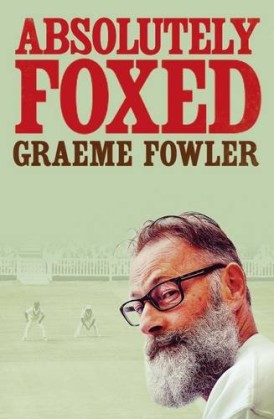Absolutely Foxed
Martin Chandler |Published: 2016
Pages: 320
Author: Fowler, Graeme
Publisher: Simon and Schuster
Rating: 4.5 stars

I suppose I had better declare an interest here. Graeme ‘Foxy’ Fowler may not have the most spectacular batting record, but he has always been a hero of mine, and without a doubt my favourite cricketer of his generation. Something I can say with certainty is I am not the only person to feel that way, as Foxy’s pre-eminence is the only thing my brother and I have ever agreed on. In fact to be fair I would have to concede that even my loyalty is outstripped by that of my sibling. To my slight shame I have to confess I gave up calling for Foxy’s return to England colours in 2005. My brother though, despite Foxy now being nearly 60 years of age, will to this day champion his cause at every opportunity.
Why did Foxy have this effect on us? It cannot have just been that he was a Lancastrian, although that undoubtedly helped. So too did the fact that when he was in form and in the mood, Foxy could be a very stylish and entertaining batsman to whom all bowling came alike. But the real clincher was the manner in which he batted when all was not well. Foxy could look truly awful. His foot movement would appear totally out of synch, and his shot selection so poor that even a couple of players as talentless as us could see where he was going wrong. On those occasions, and they were by no means infrequent, his attitude was what captivated. No one has ever toughed it out quite like Foxy and often his many supporters were rewarded by his, eventually, managing to play himself into some sort of form.
For those who recall the match, the ultimate Foxy memory is of his century at Lord’s against the fearsome 1984 West Indians. He was at his most obdurate that day. It certainly wasn’t easy for him, but he never gave up and reaped the rewards. Seven months later Foxy showed he could play the spinners as well, as in Madras he became the first Englishman to score a Test double century in India. He was on the way to what would have been a fourth century in the next Test as well but, as things turned out, he never played another Test.
What happened? It turned out Foxy had been playing for years with, effectively, a broken neck, vertebrae damaged in a car accident a few years before going undiagnosed. When the problem was finally spotted it resulted in a wretched season in 1985 and although the correct treatment meant health, vitality and form returned in 1986 despite strident clamouring from the Chandler family the call did not come again.
One of the more remarkable features of how the England cricket team was run in Foxy’s time, only a generation or so ago, was how appallingly badly the job was done, with communication between management and players kept to a bare minimum. It was no better at Lancashire where the system was almost feudal, and the attitudes, described in detail in Bob Barber’s biography last year, seem to have survived largely unscathed into the 1980s. Eventually, in 1992, Foxy was sacked by the county after which he had a couple of seasons at Durham before retiring from the First Class game.
Foxy’s playing career takes up the first half of the book. It is a hugely entertaining story that simply cannot be faulted. There is not a dull or tedious passage in sight and Foxy and his glamorous assistant, John Woodhouse, succeeded in making me feel not only that I knew Foxy personally but more importantly that he was a friend, rather than just a man I had always admired from afar. There is not a hint of arrogance anywhere – it is good to know I chose my hero wisely.
The second part of the book deals with the rest of Foxy’s life. He did a fine job establishing the Durham Centre of Excellence and the story of that and his thoughts on coaching generally are enlightening. Foxy also spent time in the press and commentary boxes, and brought a breath of fresh air to both. I still recall the disappointment on realising his tenure on Test Match Special was not going to be permanent.
What sets Absolutely Foxed apart from just about every other cricketer’s autobiography how is the account of Foxy’s now well known issues with depression, the subject the book starts and finishes with. Foxy clearly hasn’t been cured, but at least he fully understands what is going on. He explains with great clarity why cricketers are vulnerable to mental health issues, and is willing and able to share his experiences with others.
On this issue the Professional Cricketers Association has grasped the nettle, and hopefully no cricketer will have to write in the future, as Foxy does, that he played against three men who were to die by their own hand. Had the likes of ‘Crusoe’ Robertson-Glasgow, Sid Barnes and Harold Gimblett lived in more enlightened times it is unlikely Foxy would have had to include that sentence about David Bairstow, Danny Kelleher and Mark Saxelby. Thanks to Foxy’s openness, and that of Marcus Trescothick, Michael Yardy and Jonathan Trott, future generations of young cricketers should be spared their ordeals. Absolutely Foxed is a fine book, and highly recommended.






Leave a comment